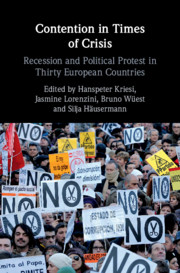Book contents
- Contention in Times of Crisis
- Contention in Times of Crisis
- Copyright page
- Contents
- Figures
- Tables
- Contributors
- Preface and Acknowledgements
- Part I A Study of Protest in Thirty European Countries
- Part II Trends in Protest in the Great Recession
- Part III Sources of Protest
- Part IV Interaction Between Convention and Contention
- 10 Electoral Punishment and Protest Politics in Times of Crisis
- 11 Are Political Parties Recapturing the Streets of Europe?
- 12 Conclusion
- References
- Index
12 - Conclusion
from Part IV - Interaction Between Convention and Contention
Published online by Cambridge University Press: 13 August 2020
- Contention in Times of Crisis
- Contention in Times of Crisis
- Copyright page
- Contents
- Figures
- Tables
- Contributors
- Preface and Acknowledgements
- Part I A Study of Protest in Thirty European Countries
- Part II Trends in Protest in the Great Recession
- Part III Sources of Protest
- Part IV Interaction Between Convention and Contention
- 10 Electoral Punishment and Protest Politics in Times of Crisis
- 11 Are Political Parties Recapturing the Streets of Europe?
- 12 Conclusion
- References
- Index
Summary
This chapter summarizes the results and concludes by pointing out two limitations of the volume. Overall continuity has prevailed in the protest arena during the Great Recession. Neither during the shock period nor during the period of the Euro-crisis has this deep economic crisis led to a general return of economic protest across Europe, nor has it led to a transformation of the action repertoire of the protestors in the streets. Southern Europe has been different, because it experienced a double crisis – economic and political, which expressed itself in a tremendous wave of protest above all in Greece, but also in Spain and to a lesser extent in Portugal. In Italy, we saw more of the business as usual that characterized the protest arena in the rest of Europe. The main effect of the protest wave that swept through southern Europe has been the transformation of the party systems in the respective countries. New challenger parties rose up, party systems fragmented and coalition formation became difficult. The focus of the volume on protest in the streets is limited in two respects: On the one hand, with the rise of new challenger parties from the left and the right, protest politics are shifting into the electoral arena, which we have not analysed in this volume. On the other hand, protest politics may be increasingly influenced by the new opportunity structure provided by the information communication technologies (ICTs), which was not the focus of our study either.
- Type
- Chapter
- Information
- Contention in Times of CrisisRecession and Political Protest in Thirty European Countries, pp. 273 - 288Publisher: Cambridge University PressPrint publication year: 2020

